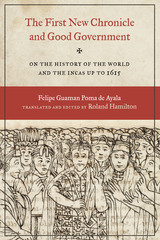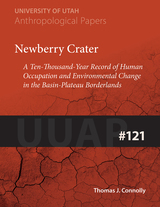
One of the most fascinating books on pre-Columbian and early colonial Peru was written by a Peruvian Indian named Felipe Guaman Poma de Ayala. This book, The First New Chronicle and Good Government, covers pre-Inca times, various aspects of Inca culture, the Spanish conquest, and colonial times up to around 1615 when the manuscript was finished. Now housed in the Royal Library, Copenhagen, Denmark, and viewable online at www.kb.dk/permalink/2006/poma/info/en/frontpage.htm, the original manuscript has 1,189 pages accompanied by 398 full-page drawings that constitute the most accurate graphic depiction of Inca and colonial Peruvian material culture ever done.
Working from the original manuscript and consulting with fellow Quechua- and Spanish-language experts, Roland Hamilton here provides the most complete and authoritative English translation of approximately the first third of The First New Chronicle and Good Government. The sections included in this volume (pages 1–369 of the manuscript) cover the history of Peru from the earliest times and the lives of each of the Inca rulers and their wives, as well as a wealth of information about ordinances, age grades, the calendar, idols, sorcerers, burials, punishments, jails, songs, palaces, roads, storage houses, and government officials. One hundred forty-six of Guaman Poma's detailed illustrations amplify the text.

Few would disagree that Western democracies are experiencing a crisis of representation. In the United States, gerrymandering and concentrated political geographies have placed the Congress and state legislatures in a stranglehold that is often at odds with public opinion. Campaign financing ensures that only the affluent have voice in legislation. Europeans, meanwhile, increasingly see the European Union as an anti-democratic body whose “diktats” have no basis in popular rule. The response, however, has not been an effective pursuit of better representation. In Good Government, Pierre Rosanvallon examines the long history of the alternative to which the public has gravitated: the empowered executive.
Rosanvallon argues that, faced with everyday ineptitude in governance, people become attracted to strong leaders and bold executive action. If these fail, they too often want even stronger personal leadership. Whereas nineteenth-century liberals and reformers longed for parliamentary sovereignty, nowadays few contest the “imperial presidency.” Rosanvallon traces this history from the Weimar Republic to Charles De Gaulle’s “exceptional” presidency to the Bush-Cheney concentration of executive power.
Europeans rebelling against the technocratic EU and Americans fed up with the “administrative state” have turned to charismatic figures, from Donald Trump to Viktor Orbán, who tout personal strength as their greatest asset. This is not just a right-wing phenomenon, though, as liberal contentment with Obama’s drone war demonstrates. Rosanvallon makes clear that contemporary “presidentialism” may reflect the particular concerns of the moment, but its many precursors demonstrate that democracy has always struggled with tension between popular government and concentrated authority.
READERS
Browse our collection.
PUBLISHERS
See BiblioVault's publisher services.
STUDENT SERVICES
Files for college accessibility offices.
UChicago Accessibility Resources
home | accessibility | search | about | contact us
BiblioVault ® 2001 - 2024
The University of Chicago Press









